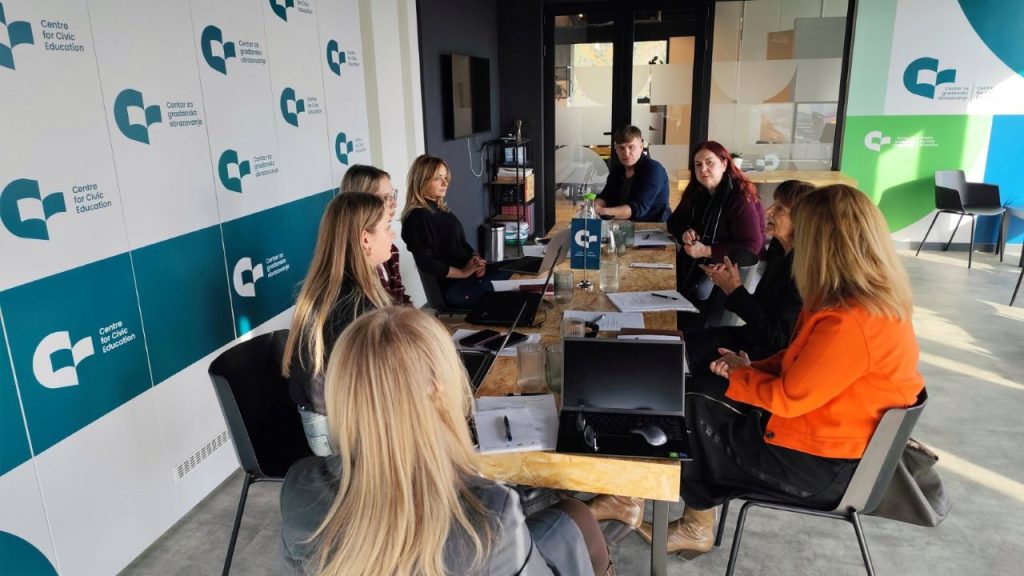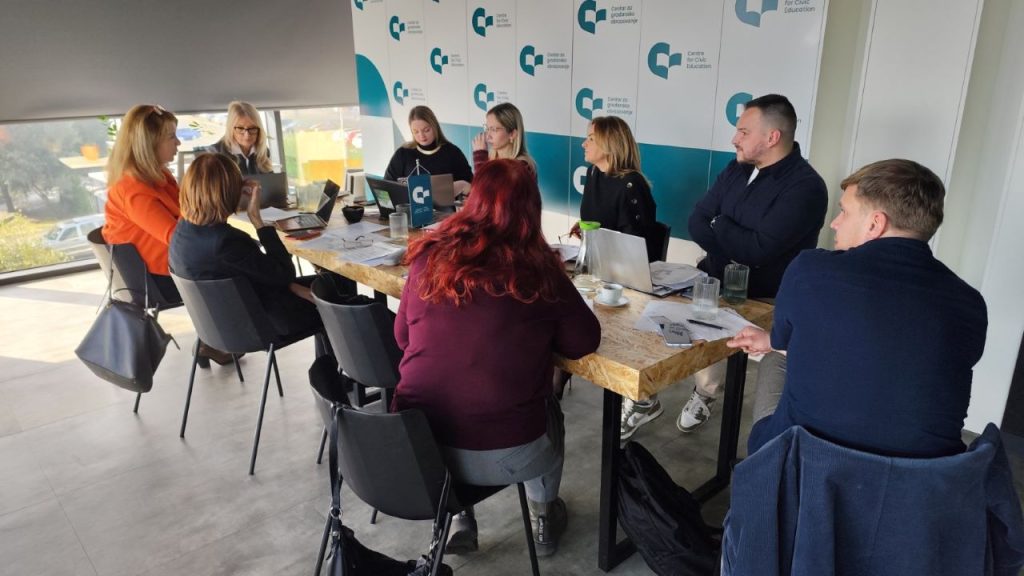The countries of the region are poorly ranked on international media freedom indexes, share similar challenges in the areas of media freedom and literacy, and are interconnected through deep social, cultural, and political ties, with political influences often crossing borders. This underscores the importance of joint interventions by organizations committed to democratic standards, media freedom, and improving neighborly relations, as concluded during the launching meeting of the project “MedIA – Lit (Strengthening Media and Media Literacy for Democratic Engagement)” implemented by the Centre for Civic Education (CCE) in partnership with the Helsinki Committee for Human Rights in Serbia, the Atlantic Initiative from Bosnia and Herzegovina, the Helsinki Committee for Human Rights from North Macedonia, and the Tirana Center for Journalistic Excellence (Albania), with support from the European Commission.
The main objective of this project is to advance press freedom and media literacy, as well as regional cooperation across the Western Balkans by fortifying professional journalism and bolstering the capabilities of the media sector. Specifically, the project will focus on fostering independent journalism in Albania, Bosnia and Herzegovina, Montenegro, North Macedonia, and Serbia by promoting, educating, and building the capacity of media professionals. Additionally, it aims to raise awareness of the importance of media literacy and combat hate speech online.
“We believe that through this initiative, media professionals, CSOs, and institutions will have the opportunity to exchange knowledge, experiences, and best practices. With joint efforts we can create an environment where the media is empowered to perform its critical role – informing the public, holding power accountable, and contributing to the development of democratic societies based on strong foundations, while citizens are educated to be sufficiently media-literate to avoid the traps of using media for propaganda and manipulation,” stated Zvezdana Kovač, Director for Strategy and Communications at CCE. “Our partners are esteemed organizations from four Western Balkan countries, and their expertise and experience lend significant credibility to this project,” she added.
“This project has brought together regional partners to jointly address the challenges of disinformation and media integrity. Media literacy is one of the greatest challenges of our time – ensuring that people can trust the information they consume. Given the current state of media, this is a demanding task,” said Edina Bećirević, co-founder of the Atlantic Initiative from B&H. “We had a highly productive initial meeting. It is significant that the project has a regional dimension; this is the best approach to resolving these issues. It is equally important that the project is led by CCE from Montenegro, an organization with proven integrity, with which the Atlantic Initiative is pleased to collaborate,” she concluded.
Ljiljana Palibrk from the Helsinki Committee for Human Rights in Serbia also emphasizes the regional scope of the project. “Despite all the differences between countries, we face the same fundamental problems – how citizens access information of public importance, whether they receive accurate or false information, how the media treats them, and to what extent the media is under pressure from authorities? Serbia is now a glaring example of how important this is, as we witness that not all citizens are informed and that they do not receive accurate information from institutions. It is crucial that we strive to support the media and empower them to adequately inform citizens,“ she states.
“Disinformation is perhaps the greatest threat to security and democracy of our time, both globally and locally, including in Albania. This is a negative consequence of technological advancement and the growing, yet unchecked, influence of social media in our societies. Therefore, improving media literacy among the general public by providing citizens with critical tools to identify and analyze real content versus false narratives is an essential challenge that must be overcome for democratic societies to survive and thrive. This project will significantly contribute to that effort,” says Dhimiter Gjodede, Executive Director of the Tirana Center for Journalistic Excellence.
“Media literacy is one of the fundamental skills, or literacies, of the 21st century. Numerous studies indicate that a significant percentage of people worldwide advocate for media literacy to become an official academic skill. This project is highly important due to its regional dimension, specifically in the area of media literacy and strengthening the media, while combating fake news, a challenge faced by all our countries,“ said Aleksandra Bubevska, Communications Coordinator at the Helsinki Committee for Human Rights in North Macedonia.
The project “MedIA – Lit (Strengthening Media and Media Literacy for Democratic Engagement)” will be implemented over 30 months and geographically covers Montenegro, Serbia, Albania, Bosnia and Herzegovina, and North Macedonia.
Ivana Matanović, Programme Associate


